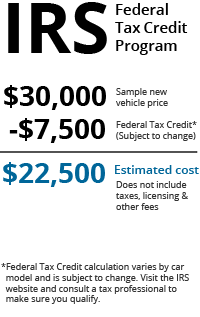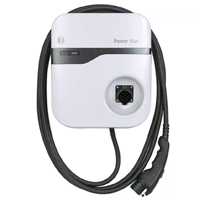Electric Vehicle Offers & Information
Electric Vehicle Federal Tax Credit up to $7,500
A federal income tax credit up to $7,500 is available for the purchase of a qualifying EV. The minimum credit amount is $2,500, and the credit may be up to $7,500, based on each vehicle’s battery capacity and the gross vehicle weight rating. Your eligibility for income tax credits depends on your personal tax situation. We recommend speaking with a tax professional for guidance.
The credit begins to phase out for each vehicle manufacturer once they have sold 200,000 eligible electric vehicles in the United States (as counted from January 1, 2010). The IRS will announce when a manufacturer exceeds this production volume and will announce the subsequent phase-out schedule on the IRS website.
- Consult your tax adviser to make sure you qualify
- Max tax credit $7,500
- Restrictions apply, subject to change without notice

INCENTIVE INFORMATION
EV Charging Equipment Federal Tax Credit up to $1,000
Consumers who purchase qualified residential charging equipment prior to December 31, 2021, may receive a tax credit of 30% of the cost, up to $1,000. Permitting and inspection fees are not included in covered expenses.
NOTE: This incentive originally expired on December 31, 2016, but was retroactively extended through December 31, 2020, by Public Law 116-94. The Taxpayer Certainty and Disaster Tax Relief Act of 2020 extended the alternative fuel vehicle refueling property credit to cover refueling property placed in service in 2021.
- Consult a tax professional to see if your installation qualifies
- Visit IRS website for additional information

INCENTIVE INFORMATION
Consider Installing a Level 2 (240V) Electric Vehicle Charger
Level 2 electric vehicle supply equipment (EVSE) provides charging through a 240 V AC plug. Level 2 adds about 10 to 60 miles of range to a vehicle per hour of charging time, making it far more convenient than standard 120 V AC charging, which adds about 2 to 5 miles per hour of charging. Additionally, level 2 charging is a more energy-efficient method of charging, as most EV have on-board components that require additional electricity the entire time the EV is plugged in.
- Level 2 chargers are four to six times faster than using a standard home outlet.
- More efficient charging than standard outlet (120V) charging.
- Many units come with additional controls, such as timers and wifi connectivity.

